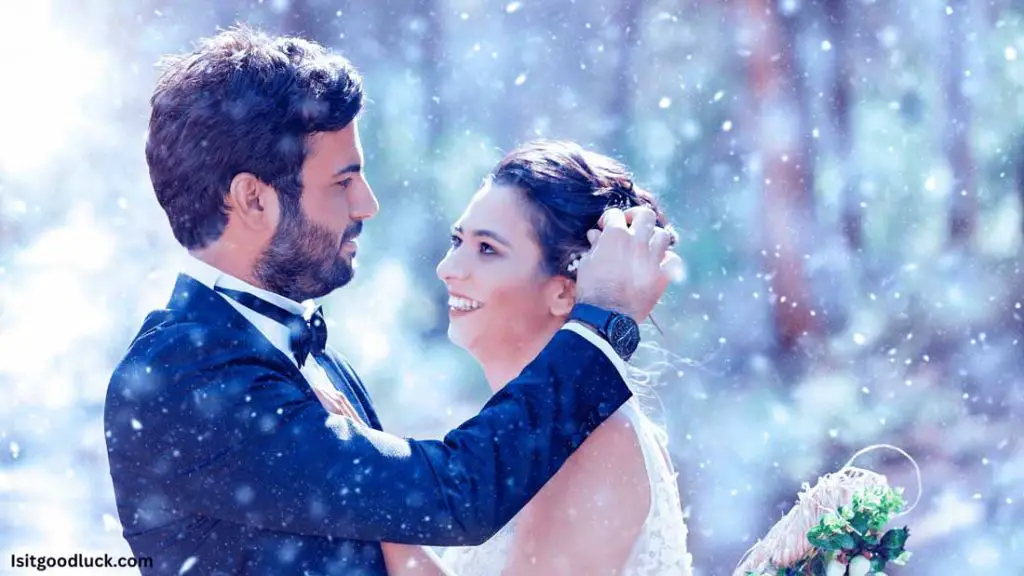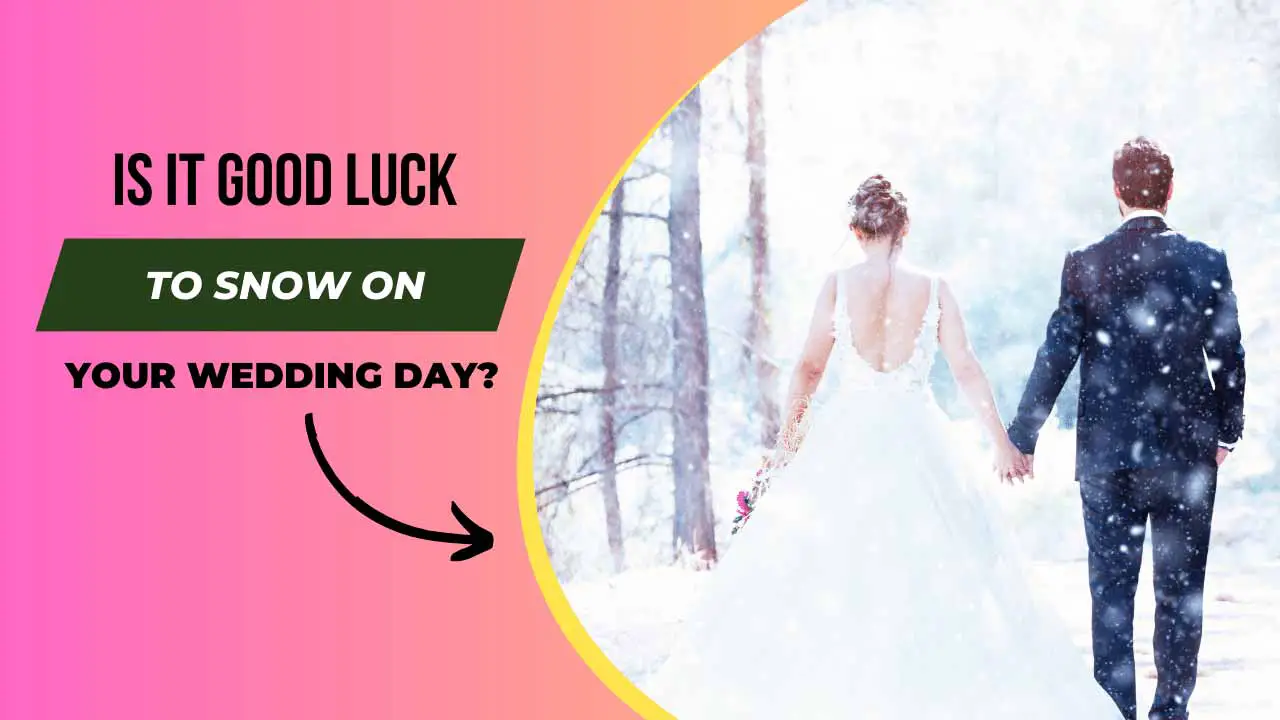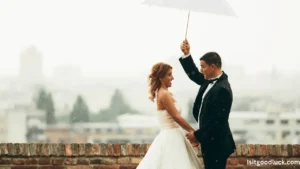The much-awaited wedding day uniquely blends joy, anticipation, and myriad emotions. Every tiny detail is pored over meticulously in a significant event, from the venue to the weather.
Especially in winter, many couples planning their wedding wonder about the age-old question, is it good luck to have snow on their wedding day?
Superstitions and beliefs about snow on your wedding day vary significantly across cultures, with some viewing it as an omen of prosperity while others may consider it less promising.
This article dives into different superstitions about snow on your wedding day, the symbolism and history of snow in wedding culture, and the practical implications of hosting a winter wedding in a snow-prone region.
Contents
- 1 Is it Good Luck to Snow on Your Wedding Day?
- 2 The History and Symbolism of Snow in Wedding Culture
- 3 Practical Considerations for a Winter Wedding in a Snowy Location
- 4 Conclusion:
- 5 FAQs
- 5.1 What are some wedding traditions that involve snow?
- 5.2 Are any countries where snow on a wedding day is particularly significant?
- 5.3 How can I incorporate the theme of snow into my winter wedding?
- 5.4 Are there any specific precautions to take if snow is forecasted on my wedding day?
- 5.5 Does snow on a wedding day have any spiritual significance?
Is it Good Luck to Snow on Your Wedding Day?
Superstitions are woven into the fabric of human culture and customs. Below are some common superstitions associated with snow on your wedding day.
- Snow as a Harbinger of Fertility and Prosperity: Snow signifies new beginnings and growth in several cultures, crediting the belief that snowfall on your wedding day can herald a prosperous and fruitful marriage. Some even believe that snow can safeguard the marital bond from potential harm.
- Snow Symbolizing Longevity and Happiness: Just as the snow blankets the earth, offering a sense of permanence and stability, it also signifies a long and content marriage.
- Snow as a Good Luck Charm: Since snow is commonly associated with positivity, purity, and love, its occurrence on your wedding day is often seen as a harbinger of good luck.
While some dismiss these as mere superstitions, others find solace and excitement in believing snowfall on their wedding day heralds a prosperous, fulfilling marriage.
Also read: Is it good if your left palm itches?

The History and Symbolism of Snow in Wedding Culture
The connection between snow and weddings has historical roots and significant symbolism.
1. Snow in Ancient Culture:
Snow was seen as a symbol of purity and innocence in ancient Rome, reflecting the tradition of Roman brides wearing white dresses reminiscent of snow.
2. Snow in the Middle Ages:
Snow was deemed a fertility symbol during the Middle Ages, associated with the winter solstice, a period of rejuvenation and new beginnings. It was even believed that snow could shield the sanctity of marriage.
3. Contemporary Traditions:
Even today, in several cultures, snow is seen as a sign of good luck. Certain wedding customs involve snow, like the belief that a bride catching a snowflake on her wedding day will lead to a long, happy marriage.
Practical Considerations for a Winter Wedding in a Snowy Location
While the symbolism and superstitions surrounding snowfall on your wedding day can be fascinating, it’s essential to consider the practical implications of a winter wedding in a snowy location.
1. Weather:
Weather is the most significant factor when planning a winter wedding. If heavy snowfall is expected, ensuring the venue is equipped to handle it is crucial. Having a contingency plan if weather conditions deter outdoor activities is also necessary.
2. Transportation:
Arranging appropriate transportation for guests, particularly in remote locations with icy or snow-covered roads, is essential to consider when planning a winter wedding.
3. Dress and Attire:
Choosing wedding attire suitable for chilly weather conditions is essential if an outdoor ceremony is on the cards. Opting for dresses made from warmer materials or pairing the wedding outfit with snow boots can help ensure comfort and warmth.
4. Photography:
Snow can offer a beautiful backdrop for wedding photos. However, ensuring that the photographer is well-equipped to capture moments amidst snowfall and cold weather is vital.
Conclusion:
Superstitions aside, the snow can add a layer of enchantment and ethereal beauty to your winter wedding.
If you’re fortunate enough to experience snowfall on your wedding day, embrace it, revel in its beauty, and perhaps, it might be a harbinger of good fortune for your marital journey.
Also read other articles regarding good luck
FAQs
What are some wedding traditions that involve snow?
Various cultures have wedding traditions that involve snow. For instance, some believe that if a bride catches a snowflake on her wedding day, it signals a long and happy marriage. In Japanese culture, the term “Yuki,” meaning snow, is often used in girls’ names due to its connotations with beauty, purity, and good fortune, considered desirable traits for a bride.
Are any countries where snow on a wedding day is particularly significant?
In Russia, snow on your wedding day is considered a symbol of wealth and prosperity. The couple is believed to enjoy a life of wealth and abundance. Similarly, snow on a wedding day is often seen as a good omen in countries with a strong winter culture, such as Canada and the Nordic countries.
How can I incorporate the theme of snow into my winter wedding?
There are many creative ways to include the theme of snow in your winter wedding. The options are endless, from invitations with snowflake designs to a snowy photo shoot. Consider having a white wedding cake that mimics the look of snow, using winter flowers like amaryllis and ranunculus, or even hosting the wedding in a venue that overlooks a snowy landscape.
Are there any specific precautions to take if snow is forecasted on my wedding day?
Yes, there are several precautions you can take. Ensuring that the venue can comfortably accommodate guests in case of heavy snowfall is crucial. Transportation should be arranged to assist guests, mainly if the wedding venue is remote. Wedding attire suitable for cold weather conditions is essential for the comfort of the bride, groom, and guests. Lastly, confirm that your photographer is prepared to capture moments in snowy weather.
Does snow on a wedding day have any spiritual significance?
Snow on a wedding day is often associated with purity, new beginnings, and transformation. It is a natural blessing that adds a magical touch to the wedding ceremony. Spiritually, snowfall can be considered a sign of divine favor and a symbol of the couple’s commitment to weather life’s challenges together.





